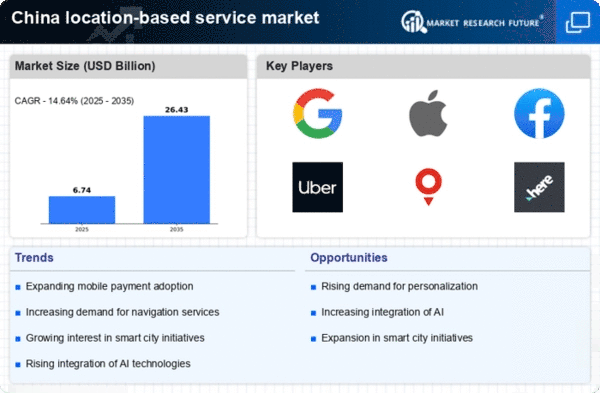Rising Smartphone Penetration
The location-based service market in China experiences substantial growth due to the increasing penetration of smartphones. As of 2025, approximately 1.2 billion smartphones are in use across the country, representing a penetration rate of around 85%. This widespread adoption facilitates the integration of location-based applications, enabling users to access services such as navigation, food delivery, and ride-hailing with ease. The convenience offered by these applications drives consumer engagement and enhances the overall user experience. Furthermore, the proliferation of affordable smartphones allows a broader demographic to access location-based services, thereby expanding the market's reach. This trend indicates a robust potential for growth in the location based-service market, as more users become accustomed to utilizing mobile applications for their daily needs.
Government Initiatives and Support
The Chinese government plays a pivotal role in fostering the location based-service market through various initiatives and support mechanisms. Policies aimed at promoting digital infrastructure development, such as the 'Internet Plus' strategy, encourage the integration of location-based technologies across various sectors. Investments in 5G technology are particularly noteworthy, as they enhance the capabilities of location-based services by providing faster data transmission and improved connectivity. As of 2025, the government has allocated over $30 billion to bolster 5G infrastructure, which is expected to significantly impact the location based-service market. This supportive regulatory environment not only stimulates innovation but also attracts investments, thereby creating a conducive atmosphere for the growth of the location based-service market in China.
Increased Focus on Personalization
Personalization emerges as a significant driver in the location based-service market, as businesses strive to enhance customer engagement. By leveraging location data, companies can tailor their offerings to meet individual preferences and behaviors. In 2025, it is estimated that around 70% of consumers in China prefer personalized experiences, which can be effectively delivered through location-based services. For instance, retailers utilize geolocation to send targeted promotions to customers when they are near a store, thereby increasing foot traffic and sales. This emphasis on personalization not only improves customer satisfaction but also fosters brand loyalty. As businesses continue to recognize the value of personalized marketing strategies, the location based-service market is likely to witness sustained growth.
E-commerce Growth and Delivery Services
The booming e-commerce sector in China significantly influences the location based-service market. In 2025, e-commerce sales are projected to reach approximately $2 trillion, with a substantial portion attributed to online shopping and delivery services. Location-based services play a crucial role in facilitating efficient logistics and delivery operations, allowing businesses to track shipments and optimize delivery routes. This integration enhances customer satisfaction by providing accurate delivery times and real-time tracking information. As consumers increasingly rely on e-commerce for their shopping needs, the demand for location-based services is likely to surge, further driving the growth of the location based-service market. The synergy between e-commerce and location-based technologies presents a promising avenue for market expansion.
Urbanization and Smart City Development
Rapid urbanization in China is a key driver of the location based-service market. With over 60% of the population residing in urban areas as of 2025, cities are increasingly adopting smart technologies to enhance urban living. The development of smart cities incorporates location-based services to improve public transportation, traffic management, and emergency response systems. For instance, location-based applications are utilized to optimize public transport routes and provide real-time updates to commuters. This integration of technology not only enhances the efficiency of urban services but also improves the quality of life for residents. The ongoing urbanization trend suggests a growing demand for innovative location-based solutions, thereby propelling the location based-service market forward.
















